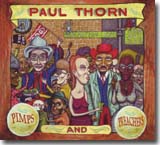|
Paul Thorn
Pimps & Preachers
Perpetual Obscurity Records
|

Pimps & Preachers is Paul Thorn’s
ninth album, released on his own label Perpetual
Obscurity Records. Thorn, previously a skydiver and
prize fighter originally from Tupelo, Mississippi,
takes the theme of this album from his childhood –
his father was a Pentecostal Minister while his
father’s brother was a pimp who suddenly showed up
when Thorn was 12 years old.
Whilst this CD isn’t strictly 100% blues, there’s
enough blues in it to qualify it here. It has
influences as diverse as Robert Johnson and Tom
Waits, and lots in between. The tracks that aren’t
exactly blues do have blues influences, amongst
those of country rock, etc., and the fact that it
isn’t a pure blues album shouldn’t put anyone off of
listening to it, because it’s full of good music.
All 13 tracks are written, or co-written, by Paul
Thorn and he comes across as a good songwriter as
well as an accomplished musician.
The CD opens with “You’re Not The Only One,” a
country rock number a bit like some of the early
Eagles songs, and that’s definitely not a criticism.
This leads into the title track of the album, “Pimps
& Preachers,” and the first of the bluesy tracks – a
good one!
Track three has a bit of a country influence –
“Tequila Is Good For the Heart,” and that’s followed
by a nice ballad, “Love Scar,” which was influenced
by a tattoo that Thorn saw on a woman’s shoulder in
London.
“Weeds In My Roses” puts me in mind of some of the
better Lenny Kravitz songs, and it’s a very good
blues-rock number which leads into the Bruce
Springsteen style “Better Days Ahead” – some advice
for anyone suffering from the bad times of the
moment.
There’s a real mix of songs from then on, from the
tear jerker “Ray Ann’s Shoes” through the country
blues rock “You Might Be Wrong,” the soulful ballad
“I Hope I’m Doin’ This Right” to the boogie country
blues “I Don’t Like Half The Folks I Love,” and the
final track, “That’s Life,” an intense, sad ballad
about life and love.
From my point of view, this is the best thing that
Paul Thorn has produced so far.
--- Terry Clear
Paul Thorn’s life reads like one of the
characters in a William Faulkner story. He was
raised in Tupelo, MS by his father, a Pentecostal
minister. Over time, he has worked in a furniture
factory, jumped out of airplanes, and even had a
boxing career (10 wins, 3 losses, 1 draw), once
fighting the legendary Roberto Duran on national TV.
He’s also recorded for a major label and has opened
for acts like Bonnie Raitt (who calls him one of her
favorite artists), Sting, Mark Knopfler, and John
Prine.
At the age of 12, Thorn’s uncle showed up in Tupelo
from California. Back in the day, he had been a
pimp, and so Thorn was now exposed to the secular
side of life along with the religious aspects of
life taught to him by his father. This relationship
is the key to the message of Thorn’s latest CD,
Pimps and Preachers (Perpetual Obscurity
Records), where the sacred is mixed with the
profane, because you can’t tell what one is without
knowing about the other, as perfectly expressed by
Thorn’s “I Hope I’m Doing This Right.”
Thorn’s songwriting is incredible. Each song on
Pimps and Preachers has its own story, sometimes
humorous and poignant in the same song (“Tequila Is
Good For The Heart” and “I Don’t Like Half The
People I Love” are shining examples). The characters
in his song, from the woman with the tattoo in “Love
Scar” to the central characters in “Ray Ann’s Shoes”
and “Nona Lisa,” all seem to live and breathe.
Best of all is when Thorn reaches from within his
own personal story, like on the title track, which
is a capsule summary of his upbringing and how he
was taught to “get out there in the game. Don’t sit
up in the bleachers,” and the mesmerizing “That’s
Life,” with lyrics taken entirely from words spoken
to Thorn by his mother.
What’s frustrating about today’s music scene is the
obsession with categorization….is this guy country
or blues….do I put this disc in the Americana
section or in the rock section? That almost
guarantees that artists like Paul Thorn will not
reach the audiences that they deserve because of the
tendency to pigeonhole artists in one genre or
another. Thorn’s music takes in the blues,
alternative country, folk, and roots rock, but often
music lovers who don’t ordinarily follow those
genres miss out on wonderful music like this, and
that’s a shame. Don’t let this one pass you by.
--- Graham Clarke